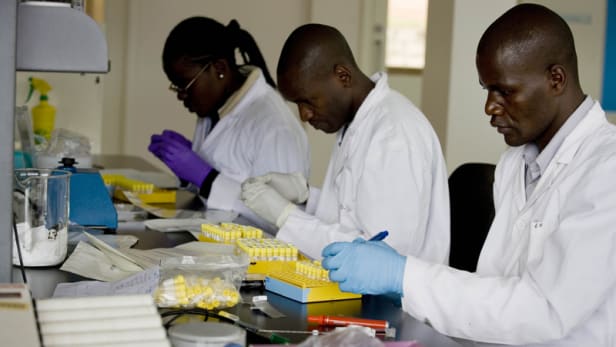 25 January 2017. How an Australian mentoring program is improving plant biosecurity in Africa.
25 January 2017. How an Australian mentoring program is improving plant biosecurity in Africa.Plant biosecurity management can be a boon to agricultural economies in sub-Saharan Africa, and Australia has a wealth of expertise to share. That’s the logic behind a mentoring program that helps the Australian Centre for International Agricultural Research and the Plant Biosecurity CRC partner with fellows working at agricultural institutions in 10 African countries.
The resulting program, the Australia-Africa Plant Biosecurity Partnership, aims to transfer skills in designing, delivering and managing plant biosecurity — measures to safeguard plants from pests and diseases.
In 2014, ACIAR contracted PBCRC to deliver a mentoring program to help improve biosecurity capacity in Africa, particularly in Burundi, Ethiopia, Kenya, Malawi, Mozambique, Rwanda, Tanzania, Uganda, Zambia and Zimbabwe. That project would have a budget of $1.2 million through 2017, jointly funded by ACIAR and the Department of Foreign Affairs and Trade. PBCRC formed a consortium to deliver the program, including the Centre for Agriculture and Bioscience International and The Crawford Fund.
The new program was advertised to biosecurity organizations in each of the 10 African countries to seek applicants. The project team, including leaders Bill Magee and Roger Day, then selected 15 senior fellows to visit Australia for an initial six-week training in Nov. and Dec. 2015. The initial applicants came from the public sector.
“Australia is well known for its strong biosecurity systems and has been my reference even in the course of trying to develop documents and application of plant biosecurity measures,” Mary Githinji, from the Phytosanitary Department with the Kenya Plant Health Inspectorate Service, one of the fellows.
Once participants returned to Africa, their new international network continued to be in contact to provide ongoing mentoring and support, including by visiting the fellows in their home countries at times. The 15 senior fellows have also become mentors. The program selected 30 people as associate fellows in 2016. This time, their training was held on the continent, utilizing Australian experts, as well as the senior fellows.
Beyond 2017
As each of the African participant countries work to develop and implement individual action plans, the project partners will be looking for a future host of the program and network.
In 2017, they will seek to partner with a major African institution, such as the Common Market for East and Central Africa or Food and Agriculture Organization. “Our two and a half years of funding from ACIAR is expected to finish and we need to preserve, and hopefully expand, what we have created in terms of network between these two countries,” Magee explained. “Preferably, we want to have it hosted by an institution within Africa to give our program a longer life.” What the program will look like beyond 2017 will be in the hands of the new host.

No comments:
Post a Comment